After an extremely difficult 2018-2019 season, the European top fruit estimates given at the beginning of August created a positive mood for the new season’s apple and pear sales. In Europe, 20% fewer apples were expected to be harvested in the 2019 cultivation year than the 2018 year. For pears, the harvest would probably be 14% lower than the previous cultivation year.
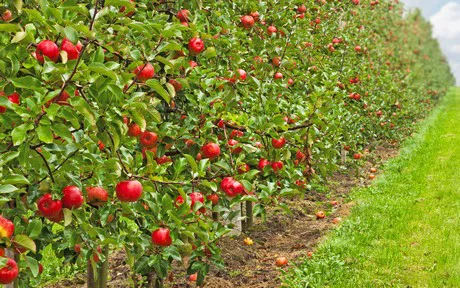
These lower yields should create a little breathing room for the sector, which was financially hard-hit last year, due to quality and storage issues caused by the dry weather. It is now a few months later. The pears and most of the apples have been harvested. It is time to see if the predictions have come true. Dutch and Belgian top fruit market players were asked about their experiences and expectations.
The short-term outlook remains positive. It is also, however, clear that, especially for pears, forecasts regarding sales and price formations have not yet been met. It also seems the - much-discussed and recently-renewed - Russian boycott still has a considerable effect on the top fruit sector. Subsidized competition from Eastern Europe is still generally regarded as disruptive too.
Kris Wouters: “Good prospects for apples and pears”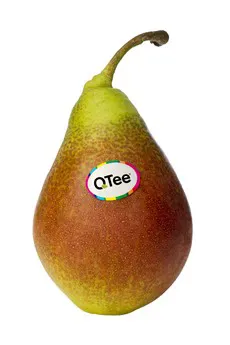 “If everything proceeds as normal, it should clearly be a better pear season than last year,” says Kris Wouters, of the Belgian Produce Wholesaler, Fruithandel Wouters. In his experience, even if there are high expectations, these do not always materialize. “In today’s world, anything can happen. Brexit is also still on the way.” Kris points out that current Class I pear prices are lower than everyone expected.
“If everything proceeds as normal, it should clearly be a better pear season than last year,” says Kris Wouters, of the Belgian Produce Wholesaler, Fruithandel Wouters. In his experience, even if there are high expectations, these do not always materialize. “In today’s world, anything can happen. Brexit is also still on the way.” Kris points out that current Class I pear prices are lower than everyone expected.
He has noticed that there are significant differences in quality at Belgian farms too. This means between 30 and 40% of some batches have to be sorted as Class II. Kris thinks the thinning of the fruit is to blame. Sometimes there was too little thinning; sometimes there was so little fruit, they could not be thinned out at all. “There are a lot of Class II pears. It becomes difficult to get a good price for these."
On the other hand, Kris expects good-quality pears' prices to climb. “Once all the pears and other summer fruit varieties have been sold, I think there is a real chance that prices for the good quality products will rise.” He considers this year’s storage conditions - although also hot and dry - to definitely be better than last year’s. “It is difficult to predict, but there are plenty of indications that this year’s pears will be better. Their quality will be better, which helps you get better prices too.”
Demand from India
When it comes to apples, Kris thinks there has been a lot of sun and hail damage, which has lowered the expected production somewhat. But, with this fruit too, prices are expected to be good. This is because this year, in Poland, far fewer apples grew than in previous years. Jonagold variations make up about 80% of the Belgian apple production. Despite this, Kris has noticed an ever-decreasing demand for these varieties in not only Belgium but Europe as well.
“There are more and more overseas apples and club varieties In Belgian supermarkets.” A bright spot for the Jonagold-like apples is the demand for these from India. “That is a very tough market that wants high-quality products but mostly does not want to pay the best prices for it. But, it could well be a market to which we can send some of the apples, making things slightly easier on the domestic market.” Kris expects the good or not-so-good prices of apples to depend on deliveries to India. It looks like this product can be sent to that country from January next year.
Rough-skinned
Concerning top fruit sales to distance countries such as China, Brazil, or Mexico, Kris thinks every little bit helps. Yet, it is a very small step toward the market’s recovery. “In good years, as much as 130,000 tons of Belgians Conference pears went to Russia. In a good export year, 4,000 tons of these find their way to China. This country is the most important new destination for pears.” Added to this, most people in these new markets are not familiar with Conference pears. They have issues with the fruit’s rough skin - the Conference pear’s characteristic rust-brown patches. Fruithandel Wouters has found that exports of its new pear variety, the QTee - which is red-blushed and smooth - is going much easier to new destinations.
Structural problems
This year’s prospects may have led to a positive mood, but it changes nothing structurally, Kris indicates. “Now new varieties of both pears and apples have to be found. It is really not wise to add another Conference-like pear or Jonagold-like apple variety. When people still want to invest in Belgium’s fruit cultivation, they must look toward new varieties or other types of fruit.” This is a step into the unknown that could go badly, admits Kris. “However, if you are still planning Conference or Jonagold variants nowadays, I am almost sure things will go wrong.”
He also sees it is hard for companies in the top fruit sector - which have been under pressure for years - to find money to spend on their businesses. “These are considerable investments which, after these past few years, are hardly or not at all possible for most companies." Kris sees only one culprit for everything that is currently going awry in the Belgian fruit cultivation sector - the European Union. “They have subsidized Eastern European countries, especially Poland. And, with the pears, they went and got into an argument with their neighbors, the Russians. Fruit cultivation is being punished for European decision-making.”
Kees Boonman: “Since there is less this year, they should sell”
Kees Boonman is from the Dutch company, Zeelandfruit. He reports a good crop. “Harvests have been disappointing everywhere; we can, however, not say that at all here.” He points out that, in contrast to last year, this cultivation year’s quality is good. “The quality is good and we can, once again, do plenty of exports without having to worry about what the apples and pears will look like when they arrive." Kees expects this season’s prices to be higher than those of last season. He indicates that the prices are currently still a little disappointing. This low price is because clients are still used to the old prices. “It is simply more difficult to make money.” But, he is certainly optimistic for the medium term. “I am encouraged and have been for a while.”
Kees Boonman (right) at the World of Food in Moskou 2018
Unfair competition
Zeelandfruit exports apples and pears to mainly Eastern Europe and Scandinavia. This top fruit supplier does not focus on exports to far-off destinations. The company does, however, believe these kinds of exports can undoubtedly help the market recover. “Everything that goes there is off the European market.” Kees also points out that after export possibilities to Russia stopped, exporters went looking for other routes. “If you are not careful, you become each other’s competitor.” Zeelandfruit, itself, used to export 90% of its goods to Russia. The company, therefore, lost sales, but they have since found replacement markets in Eastern Europe.
Kees is not so optimistic about the long term. He points out that costs keep rising and that in the Netherlands, for example, harvesting costs are higher than in countries like Poland. He has noticed that even in Belgium - no more than 30km from his business - harvesting costs are lower than in the Netherlands too. He blames the Dutch government for paying too little attention to the top fruit sector. He also thinks that by subsidizing fruit production in Eastern Europe, the EU promoted unfair competition. “It is tough to win then.”
Kees also says the changing climatic conditions of the past few years have had a major impact on the top fruit sector. He sites the past summers’ dry weather and the recent sun damage to the fruit as examples. “We spent a lot of money to be able to give our trees enough water, which means additional costs again. Prices drop, and costs rise - that makes it difficult to keep going.”
Co-operation
Kess is, however, of the opinion that short lines and more intensive co-operation between growers, the sorting industry, and retailers can contribute to a more future-proof top fruit sector. He believes if the lines get shorter and the fruit is repacked less often, costs could be saved. “There will still be cultivation companies in the future, but there will be more large sorting and packing plants than now. It is impossible for smaller businesses to invest in sorting lines and to stock all kinds of container sizes.”
Sustainability seems to be a theme in the top fruit trading sector. Kees has noticed the importance of the discussion about the reduction in the use of plastic and the increased use of eco-friendly packaging. He is also getting more requests for organic apples and pears. Zeelandfruit, itself, does not grow organic fruit. They have, however, seen that an increasing number of orchards are being converted from conventional to organic production. Kees, himself, advocates a sustainable product, which does not have to be organic, per se. “I think clients want a nice, wholesome product. And this is possible with organic.”
Robert Elshof: “Organic fruit’s prospects are good; I am positive about the coming winter and spring.”
Robert Elshof of Elshof Organic Fruit in the Netherlands has come to the conclusion that this year's pears are much firmer and store much better than those of last year. He, therefore, expects them to be better and last longer. “That bodes well for the season because we will have more selling time.” According to Robert, there is a little pressure on the market at the moment. “This is mainly due to the fear of not having a repeat of last year.”
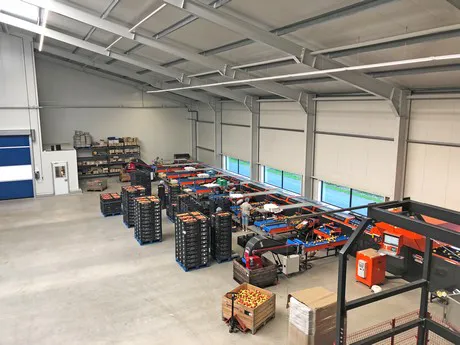
Packing station Elshof Organics
“There are still growers who want to get rid of their products quickly because they, for instance, made a loss last year. This is a pity since it is unnecessary. This year’s pears are very different from those of last year. There are also not too many of them. The expectation is that this winter, prices will rise.” Moreover, the Conference pear’s share in the market is increasing. “Germany has become an important buyer. I see plenty of opportunities there for both conventional and organic produce in that country.”
Smaller sizes moving
In contrast, Robert points out that apple sales got off to an immediate good start. “Elstar sales - which is the Dutch organic cultivation sector’s most important apple - are going very smoothly.” He has noticed that the smaller sizes, in particular, are selling well. “This is a trend you see mainly in the organic market - smaller pears and apples sell easier than the larger sizes.” Roberts looks toward the higher price for organic products are the reason for this. “For the same amount of money, you can take a little apple to work or school every day. If the apples are larger, there are fewer pieces per kg. This trend is something we, as growers, must foresee. When it comes to growth control, we will have to ensure the product remains somewhat smaller.”
Apples are more popular
Robert has determined that consumer choice leads the way when it comes to deciding which varieties to produce organically. “People still want the more well-known varieties like Conference and Elstar. You see that varieties that are, specifically, organic are a lot less popular. This forces organic farmers to cultivate conventional varieties in spite of the fact that it is far more difficult and involves greater risks.”
Robert also admits he often does not find much in his search for new pear varieties. The pear market is, after all, limited. “At most, one pear is eaten per ten apples. Apples are far more popular, and I do not see that changing any time soon.” Elshof Organic has invested in its own apple brand called BelleBio. This apple is specifically meant for the second half of the season, explains Robert. “The BelleBio remains firm and juicy and stores really well. With this, we want to ensure that we can supply Dutch apples right through the season.”
Rising supermarket share
The organic top fruit market is developing at full steam. According to Robert, a continuing trend is that organic goods - especially in the supermarket - have to keep trying to measure up to conventional products. He has also seen that the share of organic fruit being marketed through supermarkets is on the rise; at the cost of health food stores. There are often customers - Robert calls them ‘light-green’ - that are inspired by their health and the environment, but for whom an organic purchase is an impulse buy.
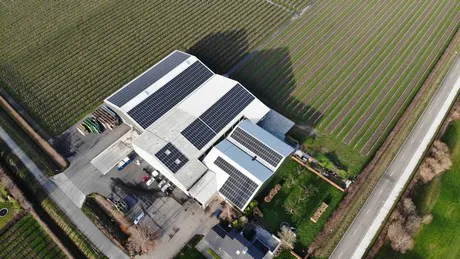
Solar rooftop Elshof Organics
These are the kind of consumers that want nice-looking fruit. “People who buy organic out of principle go to health food stores. There, the fruit may not always look as good. These kinds of consumers have no problem with this because they find it important that the product is organic.” Robert considers ensuring that fruit remains of the highest quality to stimulate sales to be the biggest challenge in the years to come.
He has noticed that the growth in organic farming has another side. “ The increase in organic cultivation ensures there is a very small market for so-called transition fruit - fruit that is grown in the three-year transition period from conventional to organic farming. There is now enough organic fruit to supply the market (almost) year-round.”
Robert believes applying technology as well as possible is vital to maximizing the quality of vulnerable organic apple and pears. “Organic farming is currently a combination of idealism and high-tech. Professional cultivation needs to be of the topmost level.” This requires co-operation. “As a grower, you can make sure you work with farmers in a similar position to prevent finding yourself in the situation conventional growers have found themselves. Everyone wants to do it cheaper than the next one. This attitude just causes issues for the entire sector. My idea of organic is not necessarily lowering the product’s cost price. Much more consideration must be given to added value.”
Louis De Cleene: “Hope for a better season”
Louis De Cleene is from the Devos Group. This Belgian company is mainly active in the pear market, with a particular focus on the Conference. He has noticed the high expectations of the start of the pear season have, unfortunately, not materialized yet when it comes to sales and price formation. “In our view, prices remain unjustifiably low.” He points out that many growers already find themselves in a difficult position after last year’s dramatic prices.
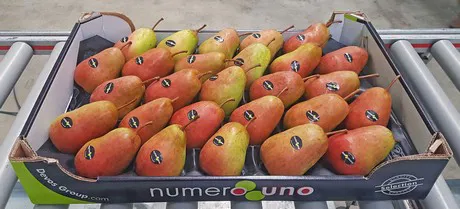 More demand for blushed pears at Devos Group
More demand for blushed pears at Devos Group
Prices will have to rise to prevent the farmers’ circumstances from deteriorating even further. Louis blames this difficult price formation on the boycott, which still plays a major role in the market. “The Conference pear, after all, still remains the most popular and best-known pear in Russia. When a sales market like that falls away, it is a major loss for many growers and traders.”
In contrast to last year, there are very few large apples this year. This is benefitting the prices. Smaller apples, on the other hand, are too plentiful. “We have to try and find our way with these. This surplus benefits the retail sector. But, with everything that falls under the sizes required by retailers - and that is going to be a considerable amount this year - we will have to make a plan.”
The low Polish production, in particular, plays a role here. In general, Louis considers the subsidized Eastern European apple production to be problematic. “The prices we hear of for Polish apples are implausible to us. We cannot realistically compete with them.”
A long road
The Devos Group focuses on distant markets like India, Brazil, and Mexico. “New destinations like Brazil and Mexico remain difficult. It demands much patience and time, and a whole lot of money.” The admittance registration to those markets, alone, costs thousands of euros, states Louis. “Then you still have to start with marketing. It entails a lot of investment in the hope of getting a hold on the market there.”
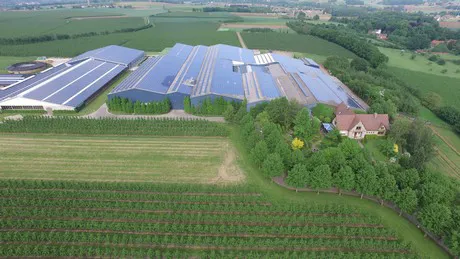
Devos Group is located in Belgium
Since the Chinese market has been worked on for longer, Louis gets the impression that things are going better there. “But, that too, is a long road.” He points out that Chinese people have to learn to eat these pears, which takes time. Louis compares it to the introduction of kiwis in Belgium and the Netherlands. “That took years as well, so it will be the same for Conference pears.”
This company’s Commercial Manager sees a rise in the local retails sector’s purchases as a better solution for top fruit sales. He argues that consumers should focus more on locally-cultivated apples and pears instead of overseas top fruit. “We do a lot with local retailers, and it is going well. We expand with this every year. If the European retails sector would focus more on local products; huge steps could be taken with these.” Local products also guarantee freshness and flavor. “This morning, I ate a Primo appel – a Devos Group club variety –straight off the pallet. It was ten times tastier than the overseas apple that has been sitting in a container for the last month.”

Appels of Devos Group
Distinction
Louis thinks it is essential for the top fruit sector’s future that it keeps diversifying its range. “The only place we can really distinguish ourselves - there are so many kinds of apples and pears - is to keep aiming for a piece of fruit that looks good, and, above all, tastes good. I think we, as Devos, must keep moving toward fruit that stands out when it comes to quality.” Moreover, he sees an increased demand for blushed, lightly-colored pears - such as their own Early Desire and Queen’s Forelle varieties - arising in the near future.
For the distant future, Louis thinks it is crucial to keep considering where the top fruit sector must go and to ensure this sector keeps holding its own against the soft fruit sector. “The sector must keep distinguishing itself. Devos would love to play a bigger role in this. We always try to keep moving forward, not as the biggest, but by bringing something new onto the market, and offering a uniformly high-quality product.”
Tim Pittevils: “Prospects are always positive but must be proven in reality.”
“Everyone is convinced that, when it comes to pears, prices will improve. That is what should happen. But, we are still in the Russian boycott tale. This will keep influencing the price. As long as there is no solution to this, I do not see things improving.” This is how Tim Pittevils of the Belgian company, BP Fruitcraft, summarizes the current pear market. Yet, he is optimistic about this season. Tim has noticed that there is far less production in both pears as well as apples. “Prospects in a normal year, sans the embargo, are all overwhelmingly positive. These prospects, however, need to translate into reality.”
Unsuitable
Tim is brief about the recently-opened distant apple and pear markets such as Brazil, Mexico, or China. “I have no faith in that.” He does not see these markets being of any value to Belgian and Dutch top fruit sales in the next five to ten years. “Our products are not suited to those markets. For example, our Conference pears’ skins are far too rough. The consumers there are unfamiliar with that. We know the Conference as a rough-skinned pear. However, in other countries, this is considered to be some type of disease.” BP Fruitcraft does have experience with exports to far-off destinations but has chosen to not continue with that.
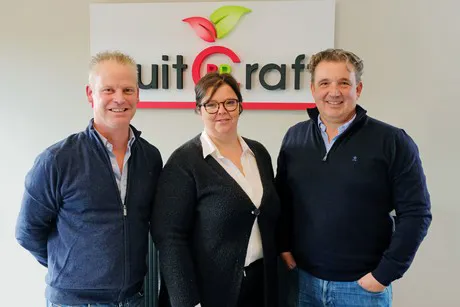
Tim Pittevils, Veronique Vanelderen en Wendy Bagels van BP Fruitcraft
Tim considers it a challenge for the sector to ensure the correct quality top fruit reaches the correct clients. “Some markets want smooth pears, of which there are hardly any, to none, available. It becomes a challenge to get the correct quality pears to the correct clients.” He expects climate change to make for uncertainty in the future. “It is still a bit of a guessing game, but these things have to be taken into account.” He thinks politicians have a role to play in this too.
Unique product
Tim does not see a very bright future for top fruit. Since the Conference pear is such a unique product, he does, however, see a future laid out for it in Belgium and the Netherlands. “We can keep focusing on this. But we must ensure it remains a high-quality product.” He thinks there are more problems on the horizon when it comes to apples. “Apples have had a hard time for the last 20 years now."
"First, Europe subsidized Poland, and now they are starting with Romania.” Tim says this creates a disparity in costs that cannot be overcome. “It is too difficult for us.” This fruit and vegetable exporter is not happy at all with the role politics played in the top fruit sector regarding the boycott. “In fact, the horticultural and agricultural sectors are the bargaining chips in the war with Russia.”
Jacco van Kessel: “If sales stay on track, prices will rise”
“The quality is good,” says Jacco van Kessel. He is from the Dutch family business of the same name. It specializes in growing, processing, and marketing top fruit. “We have had fewer problems with dry weather this year. That is undoubtedly a good thing. We will have to wait and see what happens.” Although prices are clearly at a better level than last year, Jacco has noticed that pears have not yet reached the anticipated high prices. Jacco expects that when the ULO cells in which the pears are being stored close, the market will quieten down. This should result in more stable prices.
“If sales stay on track, prices will eventually rise.” In contrast, apple prices are a little lower than they were last year. “The better-quality Elstars are still in storage. Those on offer now were harvested later, during the second or third round of picking. These are surpluses that growers want to get rid of. They, then, settle for lower prices. When the market comes quieter, these prices will recover.” Jacco also predicts better market conditions than last year for the Jonagold. This improvement is because there was a smaller harvest in, particularly, Poland. He expects Polish apple sales to be kept back because there are less to sell. “This offers more chances for Dutch and Belgian farmers.”
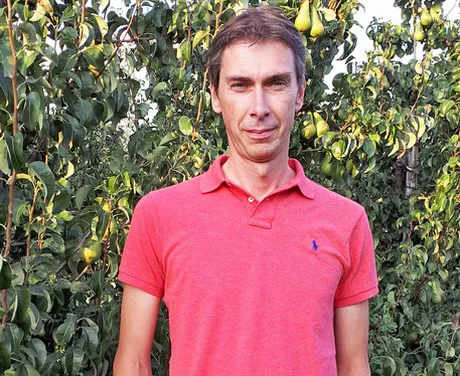
Jacco van Kessel, Van Kessel Fruit
Future-proof
Jacco finds that, although there were good prospects for the season, the top fruit sector finds itself in a less favorable situation. This started in the 90s already. Back then, the borders were opened, and the situation for apples deteriorated. Many apple growers, therefore, switched to pears. The opening of the borders actually improved this fruit’s situation. He says, as a result, apple acreage is now at only about a third of what it was at the start of the 90s. “Even so, there are more than enough apples in the Netherlands.”
The pear acreage, on the other hand, has roughly doubled in the past 25 years. “I am concerned the same thing will happen with pears as it did with apples - there will be too many.” The Russian boycott plays a role in this. However, this Manager at Van Kessel Fruit also sees the increasing pear production as being a factor. He, therefore, does not expect all the current pear companies to be future-proof. “I think acreage will certainly decrease.”
Jacco admits many factors will determine the prospects for pear cultivation. For example, it is essential to have the right varieties. But the way the pears are marketed, access to water, and follow-up can also play a role. “There are also businesses that are absolutely future-proof. However, due to unforeseen circumstances, like hail, frost, or drought, they do not survive.”
Evelina
Jacco anticipates that, for now, for many companies, the Elstar apple and Conference pear will remain the main varieties. Other varieties such as Lucas, Comice, Goudreinet, Jonagold, and Golden Delicious are also being cultivated. Some businesses grow an additional variety, often a club variety, in addition to their main variety. “There is growth potential here too. The best-known secondary varieties are the Kanzi or Junami, of which the Dutch acreage is diminishing. These are being taken over by, for instance, Migo, Magic Star, Morgana, or Tessa.”
Van Kessel Fruit, itself, has won the rights to the Evelina club variety in the Netherlands. “In this country, at the moment, there are four Evelina growers. We also planted this variety ourselves in the spring. We aim to increase its area in the Netherlands.” How large the acreage will eventually become - there are currently 15 hectares under the Evelina in the Netherlands - Van Kessel Fruit thinks will depend on how successful this apple is.
Jacco certainly sees a future for the transitional varieties and argues for a mix of varieties. This will optimize businesses. “If you have a lot of Conferences and Elstars, they all have to be harvested in a period of three to four weeks. New varieties like the Magic Star, Evelina, or Kanzi all follow-up on the existing varieties when it comes to harvesting. That benefits farmers as they can stretch out their picking times.”
kris@woutersfruit.be
kees.zeelandfruit@xs4all.nl
robert@elshoffruit.nl
Louis@devosgroup.com
tim@bpfruitcraft.com
Jaccovankessel@vankesselfruit.nl
